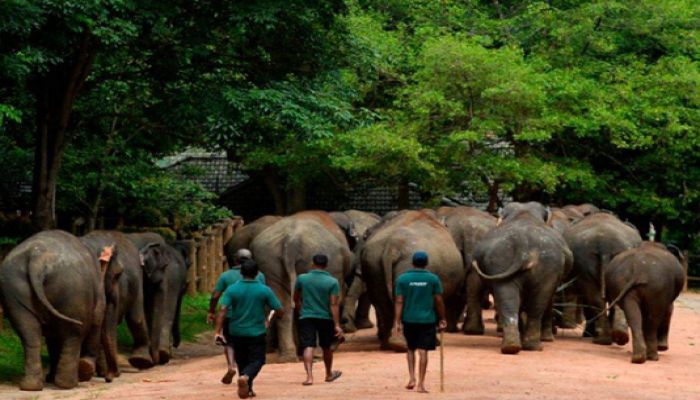
Desk Report
Publish: 12 Aug 2020, 01:31 pm

Sri Lanka's coronavirus lockdown has helped to reduce the death toll from clashes between elephants and humans, conservationists said.
A number of 405 elephants killed by humans in the world last year, up from around 360 in 2018. According to government records, a total of 121 people were killed by elephants, up from 96 the year before, reports AFP.
Speaking ahead of World Elephant Day on Wednesday, Jayantha Jayewardene, a leading international expert on elephants, said: “We can say that the human-elephant conflict eased during curfews.
“But this is a temporary situation. Farmers will start defending their crops and the killings will resume.”
Most of those elephants killed are shot dead or poisoned by farmers attempting to drive them off their property. The beasts are deemed holy in the majority of the Buddhist island and are covered, but trials are uncommon.
Many people are killed by elephants who have seen their environment diminished drastically, rampaging in food-seeking settlements.
Sumith Pilapitiya, a conservationist and former director-general of the Government's Department of Wildlife, reported that the number of elephant deaths decreased by 40% during the coronavirus lockout, which began in March and formally concluded in June.
Pilapitiya said that an total of 240 elephants were killed annually between 2010 and 2017 and the trend has since increased.
Pilapitiya told AFP: “The Asian elephant is classified as ‘endangered’, so we cannot afford to lose elephants at that rate.”
He expressed hope that a “significant reduction” during the shutdown — which included nationwide stay-at-home orders, with people only allowed out to buy essentials — would bring down the overall toll for the year.
Sri Lanka’s elephant population has declined to about 7,000 according to the latest census, down from 12,000 in the early 1900s.
-World Elephant Day-
Pilapitiya said a new panel of experts on measures to reduce human-elephant conflicts in the country would have its first meeting on World
Elephant Day.
“This may be an auspicious beginning and hopefully the government will implement the recommendations of this committee,” he said.
During the shutdown, Pilapitiya accompanied wildlife trackers who confirmed seeing baby elephant twins at Minneriya Sanctuary northeast of Colombo, the first pair seen in the wild in Sri Lanka and an uncommon sight elsewhere.
But the closing of wildlife parks since the pandemic has seen a rise in deforestation and unlawful killing among all wild species, leading the government to request a crackdown in July.
Environmental lawyer Jagath Gunawardena said law enforcement authorities were preoccupied with the coronavirus, which made poaching easier.
“Incidents of elephant-human clashes were few, but there was an increase in killing animals for their flesh,” he said.
While this lockdown officially ended on June 28, the boundaries of Sri Lanka remain restricted to international visitors. And that's hit hard by some of the residents who depend on the country's elephants for their money.
The Pinnawala Elephant Orphanage closed during the lockout, worrying that the animals may have caught the infection. It opened again last month, but its 84 elephants are largely untouched by tourists.
“Hardly anyone visits here during the week,” said Suneth Sanjeeva, who operates a shop outside the elephant orphanage, 80 kilometres (50 miles) east of Colombo.
A restaurant owner nearby said she served about 200 guests before the pandemic, but now she hardly has any customers.
Subscribe Shampratik Deshkal Youtube Channel
© 2024 Shampratik Deshkal All Rights Reserved. Design & Developed By Root Soft Bangladesh